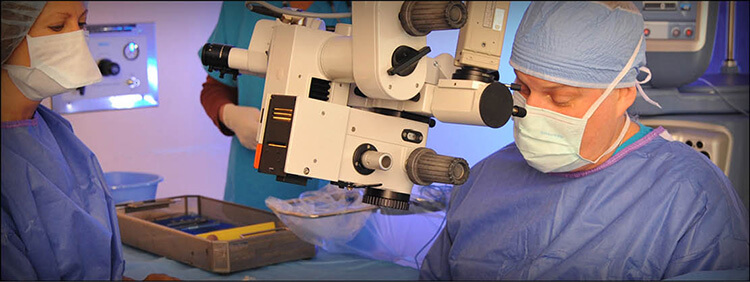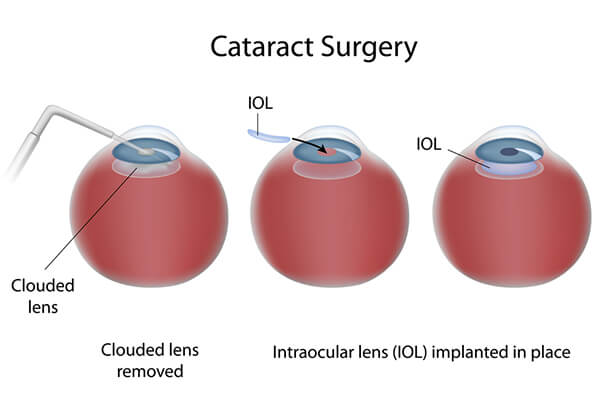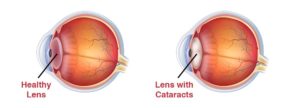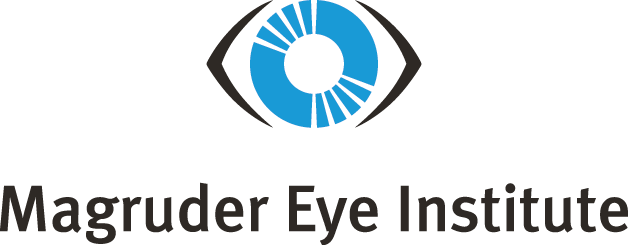
Restore your vision so you can do the things you love most.
Cataracts are very common, affecting most people over the age of 65. A cataract occurs when the natural lens in your eye becomes discolored and clouded, resulting in hazy or blurred vision. If left untreated, cataracts can eventually lead to blindness.
Cataract surgery replaces the clouded lens with a new clear artificial one. Cataract surgery is among the most commonly-performed in medicine, plus, technological advances have made the procedure even more safe and successful.
Magruder Eye Institute offers the most advanced procedures for cataract surgery to our patients throughout the Orlando areas. This includes laser-assisted cataract surgery and the latest in replacement lenses designed to treat nearsightedness, farsightedness, astigmatism, and presbyopia. Cataracts can impact your life in more way than one, if you live in the Orlando areas, make sure to call our team of professionals today!
Cataract Surgery in Orlando and Kissimmee
The Lifestyle Vision™ Custom Laser Cataract Surgery program at Magruder Eye Institute is a cooperative process designed to better educate those patients considering laser cataract surgery regarding the latest surgical options available today. Your ophthalmologist and our staff work closely with you to match the best Intraocular Lens, or IOL, taking into consideration your lifestyle, eye health, and vision goals.
The IOL is the artificial lens that will replace the clouded natural lens in the eye during the surgery. New Medicare rulings now allow for eye surgeons to offer all cataract patients options, including laser-assisted cataract surgery, and Multifocal Lens Options, both as an additional (out-of-pocket) expense to the patient. It is one of the most commonly performed Medicare reimbursed surgeries in the United States according to many sources.

How Is Cataract Surgery Performed?
Cataract surgery is routinely performed through a small, “micro” incision. Through a process known as phacoemulsification, an ultrasonic probe is inserted into the incision to break up the old lens using sound waves. For patients who choose the laser-assisted option, our cool femtosecond laser can be used to soften the lens to make removal easier. Following that, the old, clouded lens is carefully removed. Your surgeon will implant your new intraocular lens. The incision (typically stitchless) is then closed, and your recovery begins.
Recovery involves modifying your activities for a few days and using eye drops to prevent infection.
What Is a Cataract?
A cataract is a natural clouding and yellowing of the normally clear lens of the eye. It can be compared to looking through yellowed wax paper in extreme cases. When a cataract occurs, it can be removed and vision restored through surgery.

What Is a False Cataract?
- Not a film over the eye
- Not caused by overusing the eyes
- Not a cancer
- Not spread from one eye to the other
- Not a cause of irreversible blindness
What Are the Symptoms of Cataracts?
- Fading or yellowing of colors
- Poor night vision
- A painless blurring of vision
- Glare, or light sensitivity
- Frequent eyeglass prescription changes
- Double vision in one eye
- Needing brighter light to read
The most common cause of cataracts is simple: aging. Other causes include certain systemic diseases and hereditary sources. The amount and pattern of cloudiness within the lens can vary. If the cloudiness is not near the center of the lens, you may not be aware that a cataract is present. There are no medications, dietary supplements, exercises, or optical devices that have been shown to prevent or cure cataracts. Protection from excessive sunlight may help prevent or slow the progression of cataracts. Sunglasses that screen out ultraviolet (UV) light rays or regular eyeglasses with a clear, anti-UV coating offer this protection.
Does Cataract Surgery Restore Perfect Vision?
Cataract surgery is very successful in restoring vision. In fact, it is the most frequently performed surgery in the United States, with more than 3 million Americans undergoing the procedure each year. 9 out of 10 people who have cataract surgery regain very good vision. During surgery, your Magruder Eye Institute surgeon will replace the clouded natural lens in your eye with a new clear artificial one, called an intraocular lens (IOL). The IOL restores your vision, and premium IOLs may allow you to have better vision than you had before the cataract. Recent advancements in laser technology have also enhanced cataract surgery. Lasers can make removal of the old lens easier, and make incisions to put the replacement lens in place more precisely. Once the new IOL has been put into place, laser technology may be used to help enhance its performance, such as making arcuate incisions in the cornea to treat astigmatism.









